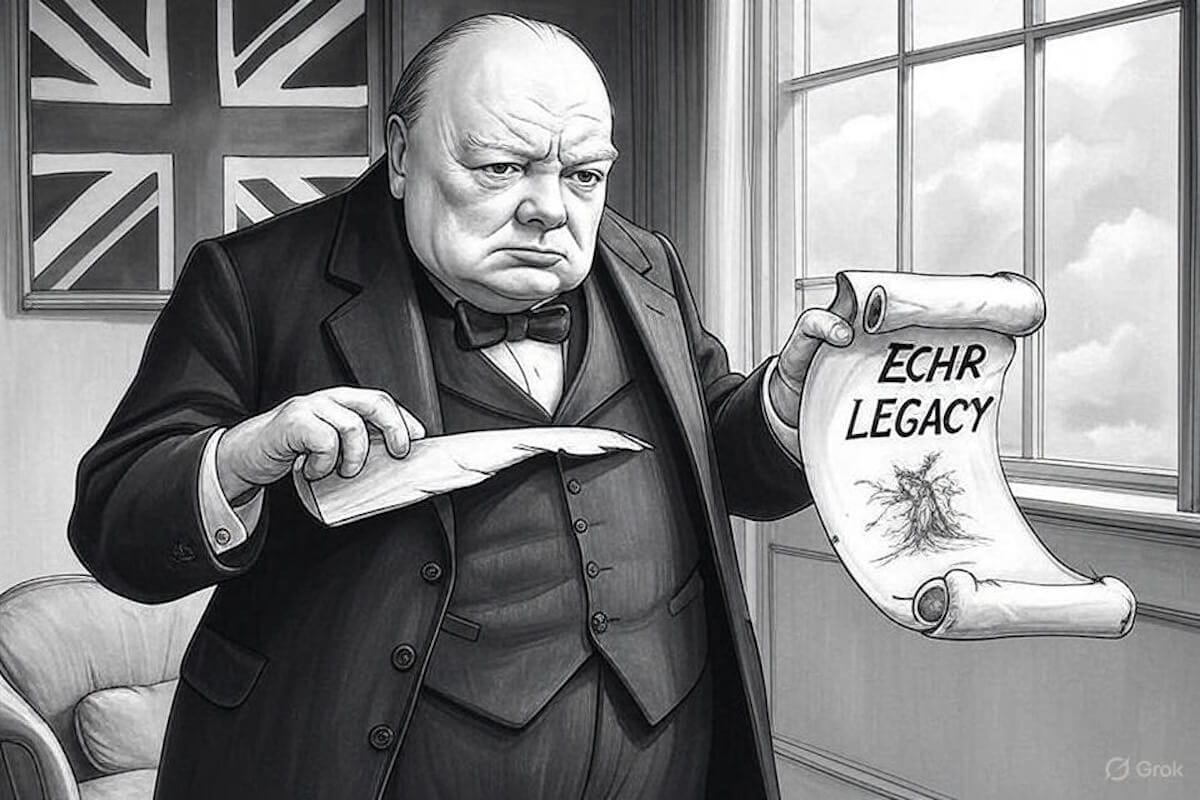Churchill wouldn't have joined Strasburg
The UK’s ECHR membership wasn’t born of noble idealism, but of post-war sleight of hand. Now it paralyses government, invents laws, and corrodes democracy.

Britain’s greatest post-war political myth is finally dead. For decades, defenders of the European Convention on Human Rights have claimed it as a British invention — a moral gift to post-Nazi Europe, authored by Churchill’s lawyers, endorsed by Labour idealists, and bound to British values. Leave it? That would be heresy.
But Lord Lilley’s forensic report for the Centre for Policy Studies obliterates this fairy tale. Citing Cabinet papers, parliamentary records, and foreign office correspondence, Lilley reveals that neither Attlee nor Churchill wanted Strasbourg judges meddling in domestic law. Britain only signed the ECHR in 1950 after securing a critical reservation: the Court would have no jurisdiction inside the UK. Both parties understood that sovereignty and external human rights courts were fundamentally incompatible.
The real constitutional rupture came not in 1950, but in 1966, when Harold Wilson’s government voluntarily allowed individual petition and gave the Strasbourg Court authority over Britain. No democratic mandate. No public debate. Just elite consensus and a legal time bomb.
A living instrument of judicial power
What followed was a textbook case of institutional mission creep. The Convention — a short post-war text, narrower than Britain’s existing common law protections — was reinvented by judges as a “living instrument.” Its vague clauses became launchpads for new, invented rights: prisoner voting, climate litigation, blocking deportations, even abortion judgments.
Parliament debates policy. The courts veto it. This isn’t rights protection, it’s judicial rule.
As Lilley notes, Strasbourg has found Britain in breach of the Convention in 58% of cases where judgment was given. The ECHR now interferes in everything from immigration enforcement to gender policy to national security. Parliament debates policy. The courts veto it.
This isn’t rights protection. It’s judicial lawmaking by stealth — with no recourse for voters.
Even the pro-EU elite knows it’s broken
Far from being a crank’s crusade, the case against the ECHR is increasingly mainstream. Lilley lists a roll-call of prime ministers — Blair, Cameron, May, Johnson, Sunak — who all ran into its roadblocks. Blair tried to deport foreign criminals and failed. May branded the Convention an obstacle to national security. Johnson’s Rwanda plan was grounded by a single Strasbourg judge, out of hours, without full court procedure.
Yet none of them had the political courage to act. They tried fudges: “British Bills of Rights,” opt-outs, declarations of incompatibility. All failed. Why? Because the ECHR, once supreme, cannot be reformed from within. Its logic is expansionary and anti-democratic. Only exit resets the balance.
We wrote it? So what.
The final argument used by ECHR defenders is the most hollow: “We helped write it, so we must abide by it.” But as Lilley shows, this is like claiming Edward Heath’s pen on the Treaty of Rome binds us to EU law forever. The drafters’ intent was precisely not to create a supranational court overriding sovereign democracies.
Britain’s ECHR membership was never the noble covenant our elites claimed.
Lilley’s report isn’t a call for isolationism. He makes clear Britain can and should remain committed to human rights — but through domestic law, Parliament, and accountable courts. Just as Canada, Australia, and New Zealand do. The idea that rights only exist when rubber-stamped in Strasbourg is not liberal. It’s colonial.
Britain’s ECHR membership was never the noble covenant our elites claimed. It was a conditional treaty, signed reluctantly, later hijacked by activist judges and cowards in Westminster. If we are serious about restoring democratic control over borders, security, and rights, we must be willing to leave.
Churchill wouldn’t have joined. Neither should we stay.